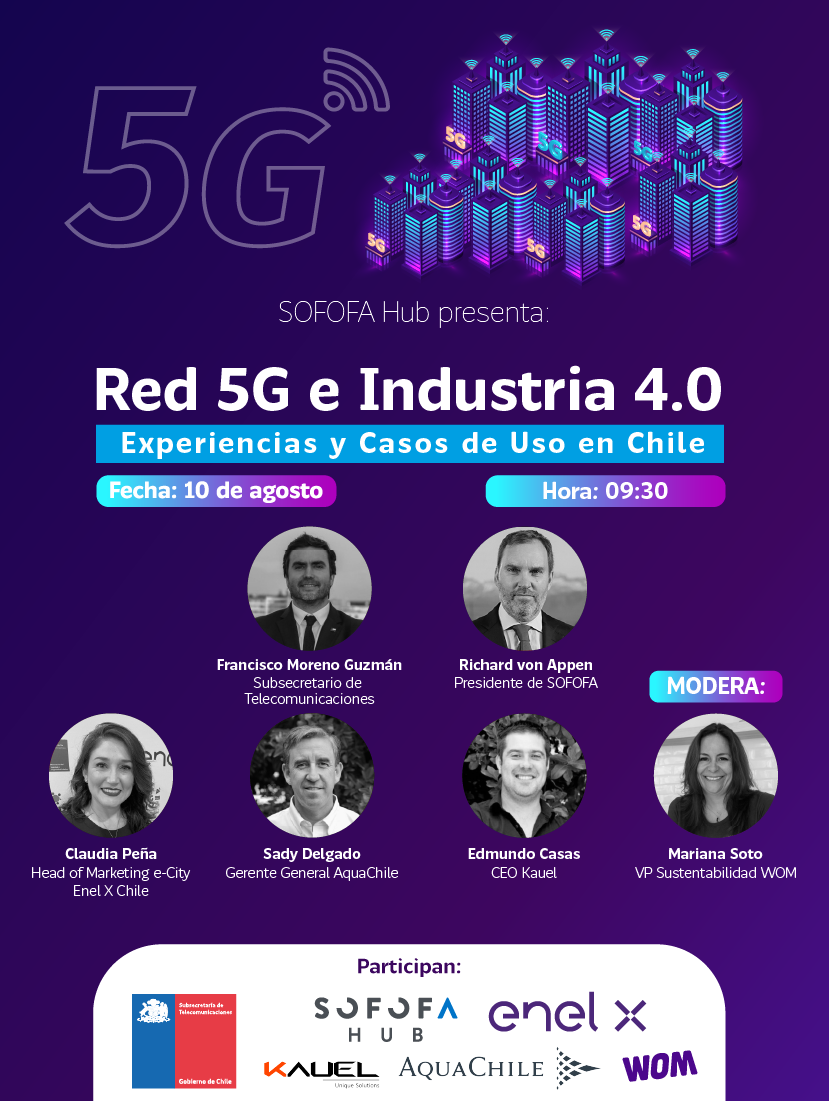The meeting, titled “5G Network and Industry 4.0: Experiences and Use Cases in Chile”, highlighted the relevance of fifth-generation mobile technology in our country’s economic development. – According to Subtel figures, in 2030 the 5G industry will contribute 14.8 billion dollars to the GDP and generate more than 68 thousand jobs.
The seminar titled “Network 5G and Industry 4.0: Experiences and Use Cases in Chile”, was held on Tuesday, August 10, jointly organized by the Telecommunications Undersecretariat (Subtel) and SOFOFA Hub, and had among its objectives to generate awareness of the potential of fifth generation mobile technology in our country’s productive activities.
The seminar, broadcasted in Sofofa’s YouTube channel, featured presentations by the Undersecretary of Telecommunications, Francisco Moreno, the chairman of SOFOFA, Richard von Appen, the Head of E-City Marketing at Enel X Chile, Claudia Peña, the general manager of AquaChile, Sady Delgado, and the CEO of Kauel, Edmundo Casas.
During the gathering, undersecretary Moreno exposed the development of 5G in our country and stressed the relevance that this technology will have in the economy of the future. According to Subtel figures, in 10 years this industry will contribute 14.8 billion dollars to the GDP and create more than 68 thousand new jobs.
“The 5G network will be transformational to our digital economy and will create value in the country’s productive sectors; therefore, our focus must be on how we can best prepare our industries to swiftly adapt to this technological leap and make the most of it. That is why, from Subtel, we will be promoting —from a public-private collaboration— the spaces to advance in as many possible applications, to generate a positive impact to the different productive spaces, and that such impact is translated into an improved quality of life for all Chileans”, Moreno explained during his presentation.
A vision defended by Sofofa’s chairman, for whom “public-private cooperation must play an essential role in accelerating economic recovery, by boosting investment, innovation, and new ventures.” We believe that 5G will have a positive impact in the business and economic scene, not only by generating productivity enhancements but also by improving the quality of the products and services that will be offered by the different sectors of the economy”.
For his part, SOFOFA Hub’s executive director stated that “connectivity and access to new digital platforms currently represents an enabling condition for increased productivity, talent development and social mobility.”
The seminar also provided an opportunity for Enel X, AquaChile and Kauel, three companies at the forefront of 5G implementation, to show their use cases for this new technology.
In her presentation, Claudia Peña, of Enel X, highlighted the company’s undertaking to deliver technologies capable of transforming energy into new growth opportunities.
“The 5G network will allow all connected devices (street lighting, smart street chattels, cameras, etc.) to link simultaneously, with low data transmission latency and the ability to effectively and simultaneously transmit data and video, thus allowing every inhabitant —including government— to have access to real-time information that will enable them to make better decisions,” explained Enel X Chile’s Head of E-City Marketing.
Regarding Aqua Chile, Sady Delgado highlighted the potential that this technology will have in salmon farming, through three pillars: the well-being of its workers, the contribution to the communities where they interact, and greater competitiveness for the company and the industry in general.
“The potential of 5G is enormous. Despite we are not in the big cities or regional capitals, the strategy and differentiation that the industry will achieve through 5G will be enormous for Chile’s future,” remarked Aqua Chile’s CEO.
